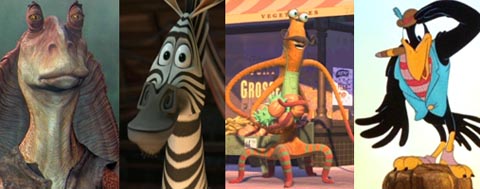

The Problem With Cartoons: They’re All Racist!

Author Stephen Marche has a problem: he wants to share comics and animated cartoons with his son, but everything is racist. He told the world about his predicament in the most recent issue of the New York Times Magazine. He used the words ‘racism’ and ‘racist’ nine times to describe everything from Asterix to Dumbo to Tintin. Amazingly, Babar gets a pass because, Marche explains, “my son won’t be turned into a more effective colonist by stories of elephants riding elevators.”
Marche seems to lack a fundamental understanding of the cartoon medium, an art form whose essence is rooted in caricature and exaggeration. He finds offensive stereotypes everywhere he looks, including Blue Sky’s Ice Age, DreamWorks’ Madagascar and Pixar’s Monsters, Inc.:
Sulley and Mike, on the way into the office, happen to pass an orange squidlike grocer with a handlebar mustache who kind of talks-a-like-a-this. Perhaps that kind of stereotype is not as gruesome or upsetting as the one in the original Fantasia, but I had the distinct impression, as my son laughed at the scene, that my Italian immigrant grandfather was turning over in his grave.
Asterix gives Marche the biggest headache. As he reads it to his son, he wonders:
What is [my son] going to ask when I explain that for 400 years, white people took black people from their homes in Africa, carried them across the ocean in chains, beat them to death as they worked to produce sugar and cotton, separated them from their children and felt entitled to do so because of the difference in the color of their skin?
Amazingly, this thoughtfulness comes from a man who admits in the article that he told his son, “I don’t know why the pirates have a gorilla,” when his son asked him about a black character in Asterix.
I can only imagine that Marche would have a coronary if he ever watched this piece of animation:
PS – Go here to read a blistering takedown of Marche’s piece.
